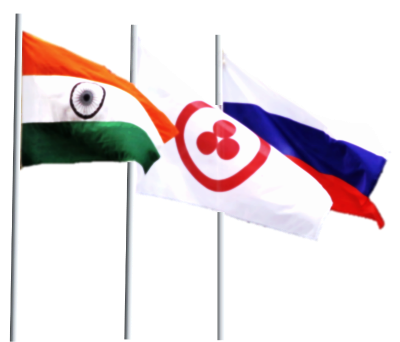08.03.2017
International Women’s Day Celebrated in the Himalayan Roerich Estate
Festive programme was organized in the International Roerich Memorial Trust (IRMT), Naggar, on the occasion of the International Women’s Day, 8th March. It was attended by a number of local women and visitors from Russia, IRMT staff, and the teachers and students of the Helena Roerich Academy of Art for Children (HRAA) managed by the IRMT.
Turning to the theme of the International Women’s Day-2017 “Be bold for change”, Dr. Singh appealed to women to be courageous in the face of changes, i.e. to be able to realize their role in the invariably changing social and historical circumstances. It is necessary for the whole society and, first and foremost, for the children. “At present I am a member of the Juvenile Justice Board,” said Dr. Singh, “and I am totally convinced that to a great extent the painful issue of juvenile crime is rooted in the women’s not fulfilling their maternal duty. We, women, are our children’s first teachers, and it depends on us whether our children become true human beings and worthy members of society.”
Congratulating the gathering on the occasion of Women’s Day, Mrs. Heera Devi, President of the local women’s organization Mahila Mandal, appealed to women to share their family and domestic problems with fellow women and lighten the burden. She also requested women to keep their household clean emphasizing that cleanliness within household is the first step towards the cleanliness without it. “I propose that everyone should do community work cleaning the area, and if Prime Minister has time for it, why not us?” asked Mrs. Heera Devi reminding the audience about the “Swacch Bharat” campaign started on the initiative of the Indian Prime Minister Narender Modi.
In continuation of the festivities the female guests of the function recited poetry and sang songs. The poem by the IRMT employee Soma Sharma sounded an emotional appeal for the women empowerment, while one of the HRAA students performed a local song “Daughter is priceless”. The programme also included a solo sitar item and a modern dance. In conclusion local women performed several traditional Kullu songs.
The celebration brought light and warmth to the otherwise cold and gloomy day of early spring. And it closed as per the good and old tradition with the favourite circular dance “nati” which was gladly joined by all female guests and IRMT staff.




The function opened with the ceremony of lighting the lamp and the prayer to the goddess of learning Saraswati performed by the HRAA students and teachers.
The Indian Curator of the IRMT Mr Ramesh Chander congratulated all women with this international holiday and remarked that worldwide women’s contribution to politics, science, literature and music is impossible to stress enough. Indian women were Prime Ministers (Indira Gandhi), space explorers (Kalpana Chawla) and mountaineers.
Discrimination against women, averred Mr Chander, should stop if the society wants to develop, for development of society is possible only if it is unified. Providing women with employment and possibility to earn is the first step towards their empowerment.
In her address Dr. Rita Singh, Consultant, Finance Ministry, Government of India, and the Chief Guest of the function said that in the traditional Indian view, “entire creation is worshipped in the shape of woman. Almost all our mountains, trees, jungles and rivers are feminine.” The International Women’s Day should be celebrated with the thought that women are powerful, for woman is faith, entire world, earth and sky can bear any calamity. And has been bearing it for centuries for the sake of her fathers, husbands, sons, for the good of society and the whole world. In India, where Sita sits on the throne equally with her divine consort Rama, where ancient texts talk about the remarkable woman philosopher Gargi and militant Queen Kaikeyi, woman since ancient times has been equal to man.
The Russian Curator of the IRMT Mrs. Larisa V. Surgina reminded the audience that the Roerichs had always stressed the ever increasing role of women in the modern world. The history of mankind is actually the history of woman, which sometimes was tragic. “Noone has the right to burn Joan of Arc,” wrote Nicholas Roerich in the difficult years preceding World War Two. The artist’s triptych “Joan of Arc” (1931) is dedicated to the young hero of France. In the right part of the triptych one sees Joan praying at the head of her troops. In the left part Joan is being burnt alive. In two years she blazed a heroic trail radically altering the course of the Hundred Years’ War in favour of her beloved France. And try as much as they could to torture her, her traitors and those in whose hands she was surrendered failed to force her to repent a single word, a single action. Guided by the Higher Power and her own heart Joan blazed like a star for a brief moment and forever remained in history as a symbol of free France>? Freedom and Truth. And those who killed her whether out of fear, envy or wickedness or maybe for thirty silver pieces, remained in history as traitors and destroyers. How relevant are nowadays the words of Nicholas Roerich, “Every man, every member of the human family bears responsibility for peace in the world. Nobody has the right to refuse the noble and sublime duty of doing good. Nobody has the right to burn Joan of Arc.”












In Himachal Pradesh the role of women is also great. The traditional weaving of shawls in Kullu and embroidered scarves or rumals in Chamba is the domain of women. The traditional Kulvi dance, nati, is yet another domain of women. Thus, women hold in their hands the traditions of Himachal and perpetuate what Himachal is famous for.












